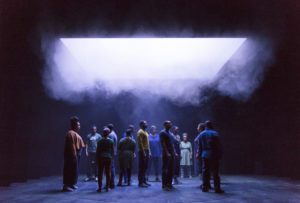You have no items in your cart. Want to get some nice things?
Go shopping
Writer/ Director.
Pic Credits: Stephen Cummiskey
There is something Godot-like about the people on the stage. Just like Vladimir and Estragon, they’re all waiting. Except that these people know what they’re waiting for. They’ve been waiting for so long, nobody knows their names, they have to sit down. And then some stand up, chairs are moved and we are plunged into the intimacy of a conversation between a mother (Sarah Quist) and her son (Hayden McLean). The words are few, it’s about his moves, his body, about how the son holds himself, his hands, his gaze when – The mother knows it’s a when and not an if – He is stopped by the police. How can the mother make her young, black and still innocent son understand without breaking his heart? So, it’s about his hands, how he holds up his palms when they stop him. This scene is not about politics. It’s about love.
debbie tucker green doesn’t use capitals to write her name. Her latest play, ‘Ear for Eye’ is brave. The mosaic of scenes that make up the first two parts of the play take place on a set designed to offer no distraction, no way out. The language is raw with pain and confusion. Tosin Cole is powerful as a young man who turns on his own old man (Nicholas Pinnock) telling him his efforts, his struggle, are a “failure”. And the older man is forced to admit their mutual impotence, “they don’t wanna change they don’t wanna be changed. So let’s start from there.” Black lives still shaped, dominated by oppression. tucker, who also directs this play, is not interested in just communicating this fact. She insists in showing us how a young, black person in America or Britain today is intimidated, is not allowed “to be me”. How he or she must learn to tip toe endlessly around white sensitivities because whatever tolerance there is today is thin. Erik Kofi Abrefa delivers a memorable performance as the young Black man who’s experienced prison for no reason. He tries to argue, he doesn’t want to strip. He doesn’t want to be broken. Eventually his voice trails off.
The second part of ‘Ear for Eye’ is dedicated to a professional encounter between a white male professorial figure (Demetri Goristas) and a younger African American woman (Lashana Lynch). The topic is a mass shooting at a high school. The dialogue begins with the man assuming the woman has come to listen and learn from him. He starts off by being patronizing but benevolent. And then he begins to understand that the woman although polite, wants to be heard too. She wants an exchange. tucker builds this scene with excruciating detail. It is fascinating and chilling to watch the man systematically refuse to contend with the woman as an equal.
The third part is a video about the sources of oppression. tucker contrasts Jim Crow laws with British slave codes. At first I thought why go so far back? And then I realized that tucker is telling us a story of mental attitudes, of deep seated prejudice, not of a legal system.
The struggle and the waiting continues.
Ear for Eye continues at the Royal Court Theatre till 24th November, 2018
About Isabelle Dupuy
Isabelle Dupuy is a writer based in London. She is currently working on a novel "Living the Dream"





Seems fascinating. You make me want to go!
I want to thank you for your review. This play is a must see. I want to thank D.Tucker for showing the world how hard and sad it is for a mom to teach your children how to behave and respond to any police presence.